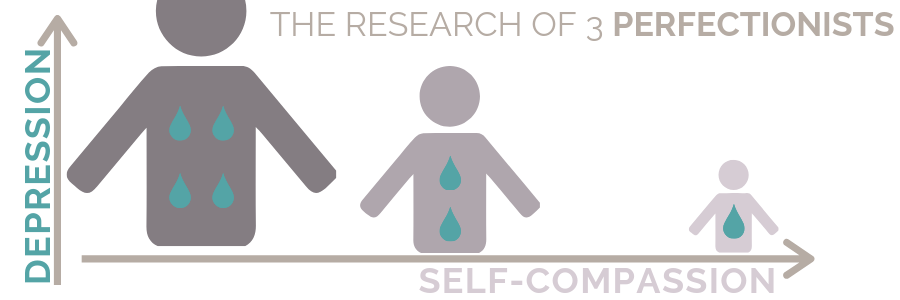
Hello!
Welcome to the last week on the topic of perfectionism. I hope you’ve learned something about yourself or another perfectionist you love!
There’s still time to register for my upcoming Workshop for Perfectionists if you’d like to dive in further; you can check it out here. Off we go!



This has been a year of realizing how deeply perfectionism impacts me, and I knew I had to do something about it. One weekend this past fall, I dove into every research article I could find on perfectionism, and the question became this: What helps perfectionists live a better life? Several research studies tested hypotheses to answer this question, and one hypothesis proved true over and over again. What helps perfectionists live a better life?
Self-compassion. Yep, it turns out loving yourself really is the secret sauce. Check this out:
In one study, researchers measured two things about similarly-affected perfectionists: their degree of depression and their degree of self-compassion. Here’s the outcome:

These three people have the same level of perfectionism, but the highly self-compassionate one is the least likely to be depressed.
What does this study mean for us? To see positive mental health results, we perfectionists don’t need to change our entire perfectionist belief system. We just need to wrap that belief system in acceptance.
Shall we?

Thanks to Dr. Kristin Neff, who has dedicated her entire research career to self-compassion, we get to know some simple, tangible tricks for getting those mental health benefits. Here is one of them (and we will explore more in the Workshop for Perfectionists!)
The Self-Compassionate Letter
1. Think of a current situation in which you feel less than perfect + need some compassion. It could be a mistake you’ve recently made, a quarrel you’re in, or an upcoming situation about which you feel nervous or anxious. Take a couple of breaths to settle into this situation.
2. Pull out a piece of paper and pen. Write yourself a compassionate letter, as you would to a dear, sweet friend or child. Be specific, be comforting, and don’t try to fix. Make sure to sign off the letter!
3. Put away the letter. Set a timer for two minutes, and use this time to venture back into the troubling reality about which you wrote.
4. Read your letter with fresh, tender eyes after the timer goes off. Savor the words; let them sink in. Cherish the gift you’ve given to yourself.
REFRESH + RENEW EVERY MONDAY WITH ILLUMINATE IN YOUR INBOX!

Isn’t it amazing how this person knows just what to say to soothe your soul? Isn’t it stunning that you have the unique, tender power to heal yourself?
How did it feel to write the self-compassion letter? How did it feel to read the letter?
How could you weave writing a self-compassion letter into your life more regularly?

Illuminate is a weekly e-mail series that provides practical tips + galvanizing inspirations for practicing an emotionally intelligent life. In our time together, we’ll operate from the assumption that you have all the wisdom you need inside of yourself + that you have a purpose the world needs to see. We will explore the tools + techniques to illuminate your own inner wisdom and purpose. If you’d like to receive this free gift of goodness in your inbox every week, subscribe here.
- Identify Your Most Fulfilling Career: A Step-by-Step Guide for Women - March 21, 2022
- POP-UP Festival Partnership with AEON Corporation - March 9, 2022
- 3 Interview Tips for Women from an Executive Emotional Intelligence Coach - February 9, 2022

How can we help children? Same technique? My 7 year old is a perfectionist.
Hi JP– great, great question. It’s worth doing some Google searches about it, but yes, you could encourage them to try these techniques. Unfortunately, perfectionism is hugely on the rise for our youth, and our society’s values is making it harder and harder not to be one. So what can you do? Love them unconditionally. Let them see you making mistakes, recognizing mistakes, and apologizing for them, all in the context of love. Help them be clear about their own values (vs. what school or friends or teachers or even you tell them to value). Most importantly, model your own self-acceptance for them. I hope this helps– good luck!